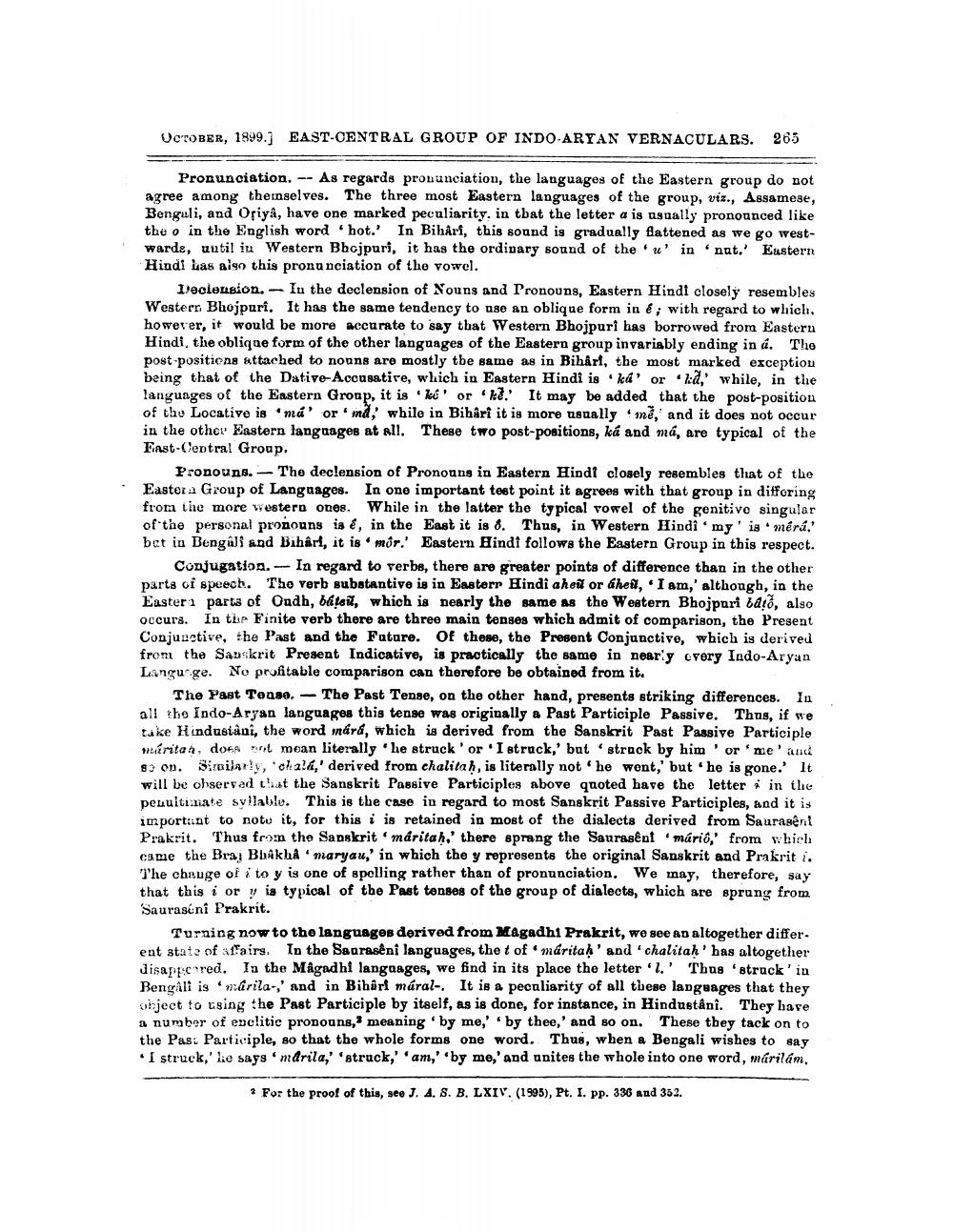________________
OCTOBER, 1899.] EAST-CENTRAL GROUP OF INDO-ARYAN VERNACULARS.
Pronunciation.
As regards pronunciation, the languages of the Eastern group do not agree among themselves. The three most Eastern languages of the group, viz., Assamese, Bengali, and Oriya, have one marked peculiarity, in that the letter a is usually pronounced like the o in the English word hot.' In Bihari, this sound is gradually flattened as we go westwards, until in Western Bhojpuri, it has the ordinary sound of the u' in nut.' Eastern Hindi has also this pronunciation of the vowel.
--
265
Declension. In the declension of Nouns and Pronouns, Eastern Hindi closely resembles Western Bhojpuri. It has the same tendency to use an oblique form in é; with regard to which, however, it would be more accurate to say that Western Bhojpuri has borrowed from Eastern Hindi, the oblique form of the other languages of the Eastern group invariably ending in a. The post-positions attached to nouns are mostly the same as in Bihârf, the most marked exception being that of the Dative-Accusative, which in Eastern Hindi is 'ká' or 'ka,' while, in the languages of the Eastern Group, it is 'ke' or 'ke. It may be added that the post-position of the Locative is má orma, while in Bihârî it is more usually me, and it does not occur in the other Eastern languages at all. These two post-positions, ka and má, are typical of the Fast-Central Group.
Pronouns. The declension of Pronouns in Eastern Hindi closely resembles that of the Eastera Group of Languages. In one important test point it agrees with that group in differing from the more western ones. While in the latter the typical vowel of the genitive singular of the personal pronouns is é, in the East it is 8. Thus, in Western Hindi my ismerá,' bet in Bengali and Bihari, it is mor.' Eastern Hindi follows the Eastern Group in this respect.
-
Conjugation. In regard to verbs, there are greater points of difference than in the other parts of speech. The verb substantive is in Easterr Hindi aheй or áheil, I am,' although, in the Easter parts of Oudh, báte, which is nearly the same as the Western Bhojpuri bato, also occurs. In the Finite verb there are three main tenses which admit of comparison, the Present Conjunctive, the Past and the Future. Of these, the Present Conjunctive, which is derived from the Sanskrit Present Indicative, is practically the same in nearly every Indo-Aryan Language. No profitable comparison can therefore be obtained from it.
The Past Tense. The Past Tense, on the other hand, presents striking differences. In all the Indo-Aryan languages this tense was originally a Past Participle Passive. Thus, if we take Hindustani, the word márá, which is derived from the Sanskrit Past Passive Participle maritan, does not mean literally he struck' or 'I struck,' but struck by him' or 'me' and so on. Similarly, chala,' derived from chalitaḥ, is literally not he went,' but he is gone.' It will be observed that the Sanskrit Passive Participles above quoted have the letter in the penultimate syllable. This is the case in regard to most Sanskrit Passive Participles, and it is important to note it, for this i is retained in most of the dialects derived from Saurasênt Prakrit. Thus from the Sanskrit máritaḥ,' there sprang the Saurasênt mário,' from which came the Braj Bhikha maryau,' in which the y represents the original Sanskrit and Prakrit i. The chauge of i to y is one of spelling rather than of pronunciation. We may, therefore, say that this i ory is typical of the Past tenses of the group of dialects, which are sprung from Sauraséni Prakrit.
Turning now to the languages derived from Magadhi Prakrit, we see an altogether different state of affairs. In the Saurasêni languages, the t of maritaḥ' and 'chalitaḥ' has altogether disappeared. In the Mâgadhi languages, we find in its place the letter '1. Thus 'strack' in Bengali is marila-,' and in Bihari múral-. It is a peculiarity of all these languages that they object to using the Past Participle by itself, as is done, for instance, in Hindustânî. They have a number of enclitic pronouns, meaning by me,' by thee,' and so on. These they tack on to the Past Participle, so that the whole forms one word. Thus, when a Bengali wishes to say I struck,' he says 'marila,' 'struck,' 'am,' 'by me,' and unites the whole into one word, márilám.
* For the proof of this, see J. A. S. B. LXIV. (1995), Pt. I. pp. 336 and 352.




